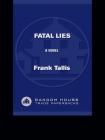Fatal Lies Frank Tallis (best fiction books to read txt) 📖

- Author: Frank Tallis
Book online «Fatal Lies Frank Tallis (best fiction books to read txt) 📖». Author Frank Tallis
“See?” said Wolf. “I told you we shouldn't have come this way.”
“What are you talking about?” said Drexler. “You just have to jump across. Some iron steps are attached to the side of the building—and they lead to a window. It's always open.”
“Jump across? Don't be ridiculous. The gap's too wide.”
“No, it isn't.”
“You'll break your neck.”
“I won't.”
Drexler took a few steps backward and then ran toward the precipice. He glided through the air and a second later landed safely on the other side. “See? Easy. It's narrower than you think.”
Wolf looked at Drexler, and then up at the octahedral spires of the Gothic façade.
“You're not scared, are you, Wolf?” Drexler called.
“Of course not.”
Wolf ran—but just before leaping, he pulled up short.
“Come on, Wolf—it's easy.”
“Your legs are longer than mine,” said Wolf. “You have an unfair advantage.”
“Life‘s unfair, Wolf! Now jump, will you?”
Another gust of wind destroyed Wolf's confidence completely.
“No.… I can't do it.”
“Well, you'll have to go the long way down—and you'll be late.”
Drexler raised his hand and loped off.
“Drexler,” Wolf fumed.
“What?”
Wolf's anger suddenly subsided. “Make up an excuse for me.”
Drexler nodded, found the top of the iron steps, and swung himself over the parapet.
37
LIEBERMANN MAINTAINED A PENSIVE SILENCE as the carriage rattled down the hill toward Aufkirchen. He appeared to be wholly occupied by the patterns produced by runnels of rainwater on the window. Raising his hand, he allowed his forefinger to trace the length of a silvery braid that was being blown sideways across the glass.
“Well?” said Rheinhardt.
Liebermann started. “I'm sorry Oskar. Did you say something?”
“Surely the rain cannot be so very interesting.”
“Forgive me,” said Liebermann, removing his hand from the glass. “I've been thinking.”
“Indeed,” said Rheinhardt. He made an interrogatory hand gesture, inviting Liebermann to elaborate.
A gust of wind buffeted the carriage, and the driver cursed loudly. Liebermann, ignoring the string of colorful expletives, made a steeple with his fingers and peered at his friend.
“I believe we can now be certain,” he began slowly, “that Zelenka and Frau Becker were lovers.”
Rheinhardt nodded. “I had not expected Sommer to be so candid.”
“Although, to be frank,” Liebermann continued, “with respect to this matter, I found your interview with Becker more revealing— and more compelling—than your interview with Sommer.”
Rheinhardt tilted his head.
“But Becker didn't say anything about his wife's liaison with Zelenka!”
“You will recall,” said Liebermann, “that he said his wife was compassionate and easily moved to sympathy. He then said that Zelenka had taken advantage of her kind nature. However, he hesitated for a fraction of a second in the middle of the sentence.”
“What of it?”
“Well, it sounded like this: ‘Zelenka took advantage of her’… and then Becker added, almost as an afterthought… ‘kind nature.’ Psychoanalysis teaches us that there is much to be learned from a careful study of the subtleties of speech. The truth was too much to hold back. He could not stop himself from telling us what he knew. Moreover, when you asked him why he hadn't mentioned Frau Becker's fondness for Zelenka before, he made a significant verbal blunder. He said: ‘Why should I have? It's entirely relevant’ Of course, what he meant to say was: ‘Why should I have? It's entirely irrelevant.’ The more an individual tries to conceal something of importance, the more he betrays himself with such errors! Finally, did you notice that whenever he spoke of his wife, he kept on touching his wedding ring? He was like a patient suffering from an obsessional neurosis, checking to ensure that some valued possession has not been entirely lost.”
“Most interesting,” said Rheinhardt, twirling his mustache, “Most interesting; however, the principal purpose of our visit to Saint Florian's today was to interview Herr Sommer, a man who you, for reasons still unclear to me, have always insisted would shine some light on the mystery of Zelenka's death. Now, as far as I'm concerned, our investigation has not been furthered greatly. He has simply confirmed what was already suspected: that Zelenka and Frau Becker were having an illicit liaison, that boys like Wolf torment scholarship boys, and that the headmaster turns a blind eye to such behavior.”
“I can assure you, Herr Sommer is…” Liebermann paused to select an appropriate word. “Involved.”
“How do you mean, ‘involved’? I don't understand.”
Liebermann tapped his fingers together. “Immediately after Sommer learned of Zelenka's death, he fell down some stairs and sprained his ankle—which gave him an ideal excuse to get away from Saint Florian's.”
“But it was an accident, Max! And it must have been a genuine accident or he wouldn't have volunteered the name of his physician, Professor Baltish. We can easily check his story.”
“No, Oskar. You misunderstand me. I am sure his sprain is real; however, as Professor Freud has explained, if one really examines the context of any accident, one can often see how it might have served some purpose. In other words, accidents are motivated. This motivation is, however, unconscious. The individual does not plan to have an accident. As far as he is concerned, it just happens.”
“All right, then, what does Herr Sommer's stumble mean?”
“Well, quite obviously, that he did not want to be questioned about Zelenka. He wished to postpone questioning for as long as possible—and he stood to benefit in two ways. First, the police investigation might have been closed before his return, thus he would have succeeded in avoiding questioning altogether. Second, if the police investigation was still in progress on the date of his return, he would have had sufficient time to collect himself and would be better prepared. Of course, it was always possible that you would travel to Linz in order to interview him—but even if you had, he would still have secured himself a period of respite. The fact that





Comments (0)